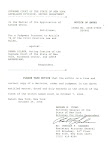BY CLIFF PEALE
The University of Cincinnati will increase scrutiny on a psychiatry professor for not reporting all of the hundreds of thousands of dollars in corporate research money she received from a pharmaceutical giant during the last decade.
Melissa DelBello now has to review all of of her interactions with companies with her department chairman, UC vice president of research Sandra Degen said Friday.
DelBello's teaching and research haven't been restricted, but the fact that she didn't tell the university about some of her outside income has been detailed in her personnel file.
"It's to protect her," Degen said. "Basically, we were documenting that there were some discrepancies in what was reported."
DelBello became the focus of controversy after U.S. Sen. Charles Grassley, R-Iowa, criticized her and UC as examples of a system he called rife with conflicts of interest that compromise drug research.
Grassley said DelBello received more than $100,000 from AstraZeneca in 2003, the year after she led a study of the company's drug Seroquel, meant to treat bipolar disorder in children. She reported that income to UC. The study was inconclusive but reported some patients benefited from the treatment.
From 2005 to 2007, DelBello reported about $100,000 in outside income to UC, but AstraZeneca told Grassley it paid her more than $238,000.
He has proposed a bill to require drug companies to disclose all of the money they give researchers.
He also criticized a company DelBello started, called MSZ Associates, that also received AstraZeneca money, something she did not tell UC.
DelBello declined to answer questions about her research funding or Grassley's criticism.
Degen said there is no evidence that the money had any impact on the substance of the research.
Grassley requested hundreds of pages of documents from UC about DelBello's research, bringing national attention to the issue of university professors soliciting corporate funds to support research that might involve the companies providing the money.
Last year, UC researchers received $8.7 million from companies, and $178.1 million from the federal government. With federal support stagnant, the university is encouraging professors to solicit corporate funds and start companies so they can pay for their research.
"It's a well-accepted fact that (companies) go out to the world's experts to study diseases with no strings attached," Degen said. "The main point is how the perceived conflict of interest is disclosed. As long as you disclose it, then it's fine."
UC now prohibits gifts from drug companies and forbids industry representatives from being on campus without a specific appointment.
Degen said the change was in planning before Grassley's requests.
Grassley said the payments and perception of a conflict of interest "is unfortunate on many levels." It is unfortunate for the University of Cincinnati that relied on the representations of its faculty," he said. "It is unfortunate for patients who once believed that their doctor was not for sale."
Original Article -
http://news.enquirer.com/apps/pbcs.dll/article?AID=/20080421/NEWS01/804210314/1056/COL02
Subscribe to:
Post Comments (Atom)























No comments:
Post a Comment